

From Google to Facebook, the Internet’s best websites are free to use. How can they afford that? Well, these “free” sites are actually showing you ads, which they charge advertisers for. When you click an ad, the free site earns money.
So if you like these free websites and want them to stay free, it’s in your best interest to tolerate those ads. And you’re bound to accept their existence more if they cater to your likes rather than your dislikes. So why not make the best of this situation and look at ads positively?
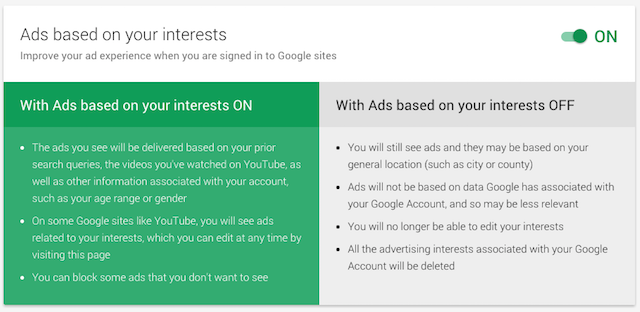
Although it’s our first instinct, we’re not going to complain about ads here. We’re also not going to get into the whole debate about ad-blocking here. This article is all about a positive spin: accept that online behavioral ads exist, companies like Facebook and Google use the information they collect about us, and that they aren’t going anywhere. They help run the free sites we love, and we’re going to make an effort to make those ads relevant for us.
Before we start, there’s one thing you should know. Facebook and Google don’t offer ways to stop ads altogether. The options you get are “interest-based”. What this means is that you can let Facebook and Google know what you like, so they can show you ads accordingly; or you can opt out of giving them any information, and they’ll bombard you with online behavioral ads you don’t like.
Either way, you will continue to see ads. In that case, doesn’t it make more sense to see an ad that you’ll like?
We’ve gone into the details of how Facebook advertising works. The same basic data is used to serve ads to you on other Facebook products like Instagram.
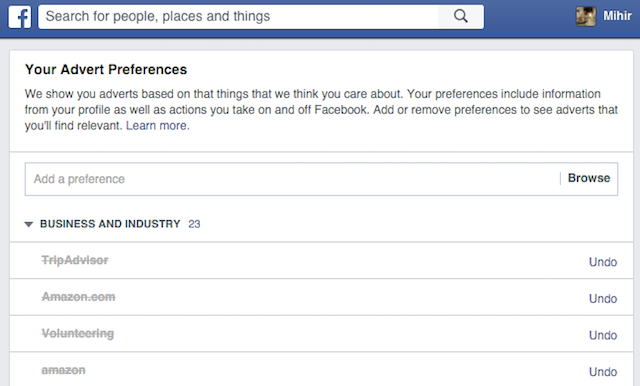
In its quest to show you ads that are more relevant to you, Facebook has been gathering information on you all this time, and has determined your “interests”. Updating your profile is one way to control the Facebook ads you see, but here’s where you can add or delete interests:
www.facebook.com/ads/preferences/edit
When you’re on this page, you’ll see a bunch of tags marked as your interests. Click the “X” to delete that interest. “Undo” restores it. And you can search for more interests, or add more from suggestions for relevant interests.
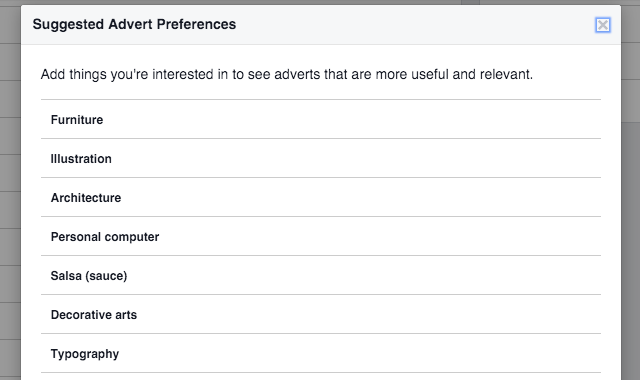
Pay attention and mark the things you really are interested in, delete what you aren’t. That way, the ads you see will be things that actually matter to you!
However, Facebook will keep automatically adding new interests to your profile. There’s a way to stop this though. Let’s dive into the Facebook Adverts settings to find out how at the ad settings page:
www.facebook.com/settings?tab=ads
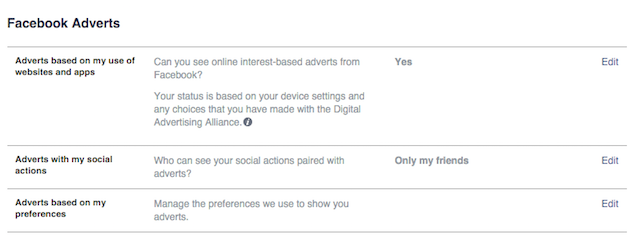
This is how Facebook tracks your use of websites and apps that have a Facebook button. Turning it off won’t stop Facebook from tracking you, but it will stop Facebook from adding these websites and apps as “interests”. If you want to protect your privacy, there are other methods to turn off tracking.
When you Like, comment, use an app with a Facebook log-in, or share a post, event, or page on Facebook, it counts as you endorsing that page and is again an “interest”. Plus, then your friends can see this endorsement as an ad! It’s part of how Facebook can use your photos even without your express permission. Want to switch that off? This is the option to do it.
When you see any advertisement in Facebook, you can interact with it immediately. Take your mouse cursor to the top-right corner and you’ll see a little “X”. Click the X to see three options:
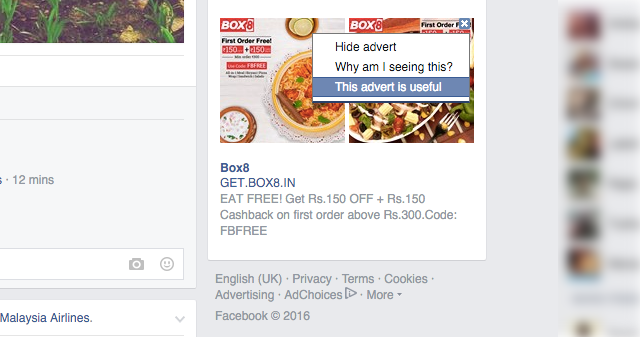
Click the first option to hide it immediately, the third to indicate interest in ads like this. The second option, “Why am I seeing this?”, opens up a pop-up window that tells you why Facebook targeted you with this ad.
In this, you can gain some additional control, like blocking all ads from the advertiser (in case that isn’t of interest to you), or going directly to the advertiser’s page and learning more about him. There’s also a shortcut to your Advert Preferences page, which we talked about above, in case you want to make some more changes.
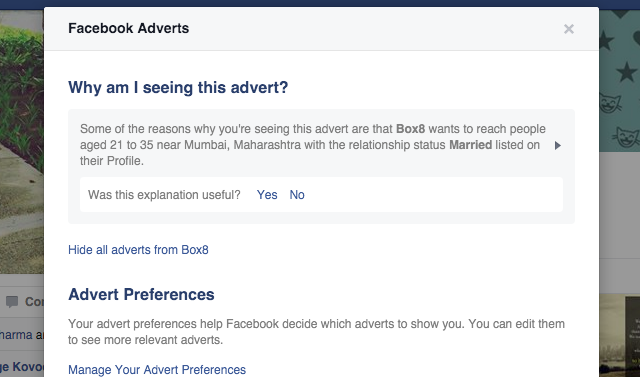
Google, Gmail, YouTube, Android, Maps and all of the company’s other main services are completely free because of advertising. For that advertising to be effective, it’s important that Google knows a lot about you, which is why it tracks your usage across the Internet. And like Facebook, based on that usage, it has a set of “interests” for you, which you can check out at:
www.google.com/settings/ads.
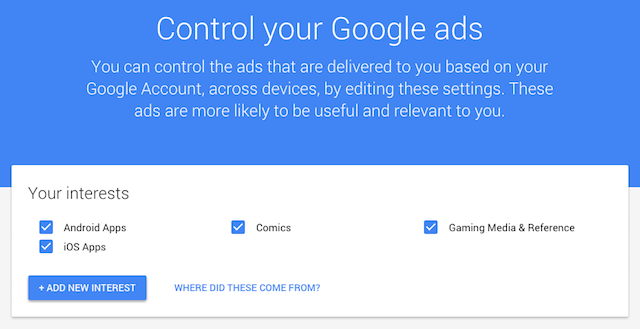
There, you will see all the categories Google has marked as “Your interests”. Uncheck any box to remove it as an interest, or click the “Add Interest” button to add a new one. Here’s the full list of ad categories you can have as interests.
Along with that, add your gender and age if you haven’t already. Go to aboutme.google.com to view your Google profile and update the options there.
Like Facebook, Google monitors your activity across the Internet using DoubleClick, an advertising tool, and adds more interests to your profile based on that. The Internet search giant is really persistent in how it tracks you and doesn’t make it easy to say no. But there is an official way nonetheless.

Install the DoubleClick Opt-Out plugin and Google won’t send a cookie every time you visit a site supported by Google’s large network of affiliates. The plugin works for Google Chrome, Mozilla Firefox, and Internet Explorer.
Similarly, signing into sites with Google+ logins also tells Google that you are interested in whatever that site is all about. So you might want to avoid that too.
Even after all this, sometimes, you’ll see an ad that you don’t want to see. It might be smutty, it might be an ad that covers the whole page you’re viewing, or you just might find it irrelevant. Whatever your reason is, you can close that ad and tell Google why.
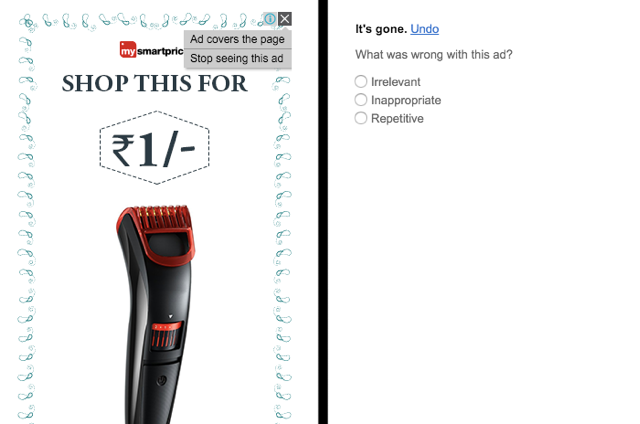
On any Google ad in any page on the Internet, the top-right corner has a tiny “i” for information and an “x” for close. Click “x” to close, and tell Google why you chose to close it. This interaction again helps Google in showing ads that matter to you.
Both Facebook and Google are part of an organization called the Digital Advertising Alliance (DAA), which is part of how they mine information about you based on what you are browsing on the internet. With 123 companies in the DAA, you probably want control over its behavior. Unfortunately, not much is offered.
The DAA does not let you see your profile or control your interests. Instead, it gathers that data silently. Your only option is a similar opt-out program, which again will only reduce targeted ads, while you still get to see ads all the time and the companies are free to gather information about you.
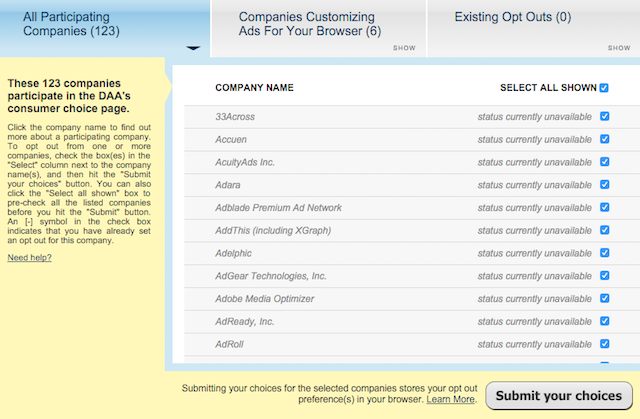
Go to aboutads.info/choices and choose which of the companies you want to stop from targeted advertising. However, know that this only works for the current browser you are using. If you switch to a different browser, you’ll have to go through the procedure again.
If you’re on your mobile, the DAA has Android and iOS apps that you can install. But again, their effect is limited.
Every time we talk about ads, it leads to a debate in the comments about ad-blocking. Let’s avoid that this time. Instead, let’s talk about the alternative: better ads vs. paid content.
Would you prefer that Google and Facebook started showing more relevant ads to you? Or do you want to pay for content instead of watching ads (like with YouTube Red)?
Image Credits: Anders Abrahamsson / Flickr


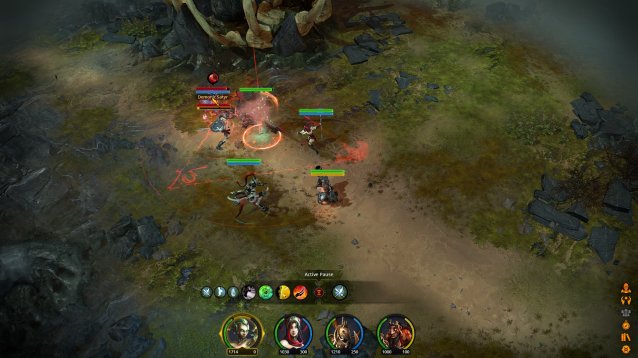

 Pokemon Red/Blue/Yellow Video Game Cheat
Pokemon Red/Blue/Yellow Video Game Cheat 14 Most Offensive Video Games Ever
14 Most Offensive Video Games Ever Cities: Skylines Guide - How to Get the Unique Buildings
Cities: Skylines Guide - How to Get the Unique Buildings Are The Painfully Tedious Chase Mechanics of GTA 5 Intentional?
Are The Painfully Tedious Chase Mechanics of GTA 5 Intentional? Destiny: How To Get Exotic Weapons and Exotic ability Guide
Destiny: How To Get Exotic Weapons and Exotic ability Guide